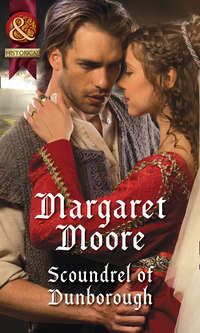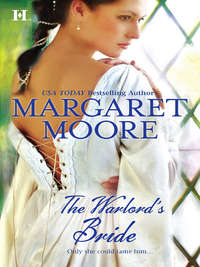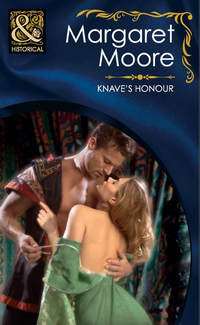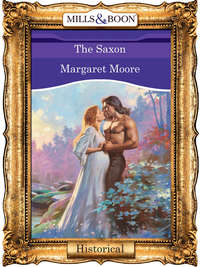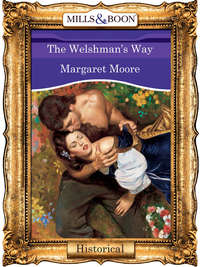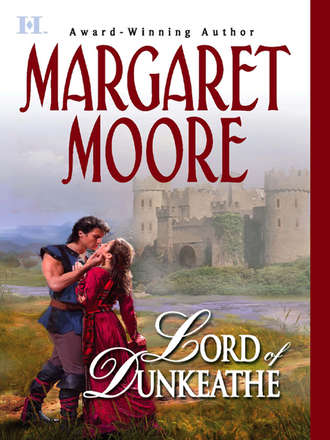
Полная версия
Lord of Dunkeathe

Praise for Margaret Moore
“Entertaining! Excellent! Exciting! Margaret Moore has penned a five-star keeper!”
—BJ Deese, CataRomance Reviews on Bride of Lochbarr
“Margaret Moore’s characters step off the pages into your heart.”
—Romantic Times
“Ms. Moore…will make your mind dream of knights in shining armor.”
—Rendezvous
“…an author who consistently knows how to mix just the right amount of passion and pageantry.”
—Old Book Barn Gazette
“When it comes to excellence in historical romance books, no one provides the audience with more than the award-winning Ms. Moore.”
—Harriet Klausner, Under the Covers
“Her writing is full of humor and wit, sass and sexual tension.”
—Elena Channing, Heart Rate Reviews
“Margaret Moore has a captivating writing style…that lends itself to pure, fluid prose and vivid characterizations.”
—C. L. Jeffries, Heartstrings Reviews
“Fans of the genre will enjoy another journey into the past with Margaret Moore.”
—Romantic Times
Margaret Moore
Lord of Dunkeathe

With special thanks to my family
for their encouragement and support.
CONTENTS
CHAPTER ONE
CHAPTER TWO
CHAPTER THREE
CHAPTER FOUR
CHAPTER FIVE
CHAPTER SIX
CHAPTER SEVEN
CHAPTER EIGHT
CHAPTER NINE
CHAPTER TEN
CHAPTER ELEVEN
CHAPTER TWELVE
CHAPTER THIRTEEN
CHAPTER FOURTEEN
CHAPTER FIFTEEN
CHAPTER SIXTEEN
CHAPTER SEVENTEEN
CHAPTER EIGHTEEN
CHAPTER NINETEEN
CHAPTER TWENTY
CHAPTER ONE
Glencleith, Scotland, 1240
“PLEASE TALK TO HIM, RIONA,” eighteen-year-old Kenneth Mac Gordon pleaded as he walked beside his older cousin in the small yard of the fortress of Glencleith. “He willna listen to me, but he might to you. Thane or no, we’re poor and he’s got to quit offering food and shelter to every sod who shows up at the gate, or we’ll no’ have two coins to rub together.”
“Aye,” Riona Mac Gordon reluctantly agreed, “but it’ll break his heart if he canna offer the hospitality of his hall.”
The red-haired Kenneth pounded his fist into his palm for emphasis. “Father must face facts. We’re poor and getting poorer. He’s got to stop inviting every stranger he meets for a meal and a night’s lodging.”
“I’ll have a word wi’ him and see if I canna make him understand we need to be more careful,” Riona acquiesced as they reached the gate. Nearby, chickens scratched and pecked in the hard-packed earth near the stables. The wooden stakes that made up the outer wall were falling down in more than one place, and the gate couldn’t have kept out a determined child. “Maybe if I tell him you’ll have naught but some rocky ground and a run-down fortress to inherit, he might listen.”
“You should tell him that there’s nothing left for your dowry, either.”
“I don’t care about a dowry,” Riona answered. “Your father did enough taking me in when I was a wee bairn and treating me like a daughter e’er since. Besides, I’m too old to think about marrying now. I’m long past the first blush of youth, and none have offered that I cared to wed.”
“You’re not too old. That fellow from Arlee didn’t care about your age.”
“That’s because he was fifty if he was a day—and nearly toothless to boot. If that’s the sort I’ll have to choose from, I’ll gladly die a maid.”
“After rising from your sick bed to make sure all’s in hand before you go,” Kenneth noted.
“Somebody has to look after you and your father.”
“Aye, and the rest of the folk in Glencleith. Tell me, how many cottages have you visited in the past fortnight? How many complaints have you heard and dealt with on your own without troubling Father?”
Riona smiled. “I dinna mind. And the women feel better bringing their troubles to me.”
“That’s as may be, but it’s a fine job you do, sparing Father worry—although a little worry might do him some good. Maybe if we told him I’ll have no money and you’ll have no dowry, that’ll finally make him see the light.”
Riona sighed and leaned back against the wooden palisade. It creaked so precariously, she immediately straightened. “How I wish Uncle had plenty of money and a fine estate, that he could live as he would, without a care in the world. It’s no more than he deserves, for a kinder, more generous man doesn’t live. He’d teach these Norman lords about hospitality.”
“Aye, that he would.” Kenneth brushed a lock of his curly hair out of his eyes, then kicked at a stone near his toe. “Some day, Riona, things will be better. I promise.”
“At least our people can be happy knowing you’ll be just as fine a lord as your father, although perhaps a little more practical.”
That brought a smile to Kenneth’s freckled face that still had more lad than man in it. “I hope so. Tell me, do ye think Old Man Mac Dougan’s really as sick as he claims? He’s been dying—or claiming to be—since I can remember.”
“Aye, I do,” Riona replied. “He was that pale, I’m sure he isna well. I tried to get him to leave that drafty cottage of his, but he wouldn’t hear of it.”
“Just took the food and fuel you brought him, is that it?”
“Aye, but I worry about him, there by himself. Maybe I can persuade—”
“Ooooh, there was a fine lass from Killamagroooooo!” a male voice bellowed in song beyond the gates.
They both stiffened, like a hound on the scent.
“There’s Father now,” Kenneth unnecessarily said, for there was only one man in Glencleith who sang so loudly and lustily. “He sounds happy. Very happy.”
Riona didn’t point out that Uncle Fergus usually sounded happy. If he sounded unhappy, that would be cause for surprise.
“Here’s hoping he got a good price for the wool, then,” she said as she opened the gate.
“Here’s hoping he hasn’t brought back half a dozen tinkers or paupers he met along the way,” Kenneth added as he hurried to help her. “I should have gone with him. I would have, if he hadn’t left before I got back from hunting. I half think he did that on purpose.”
In the interest of family harmony, Riona didn’t tell Kenneth he was right. She’d tried to talk Uncle Fergus into waiting for his son’s return, only to have him wave her off and say he’d been dealing in wool since before she was born. That was true, but Riona also suspected he’d been getting cheated since before she was born, too.
“If he’s in a good mood,” Kenneth proposed, “now might be the best time to suggest he be more…or less—”
“I’ll speak to him right away,” Riona replied. Delaying wasn’t going to make her task any easier.
Through their unguarded gate came their ancient nag pulling a cart with tufts of wool clinging to the rickety sides. Uncle Fergus was perched on the seat, his feileadh belted low beneath his ample stomach, his linen shirt half-untucked. Wisps of his shoulder-length iron-gray hair had escaped from the leather thong he used to tie it back. He looked disheveled enough that Riona might have suspected he’d been drinking, except that Uncle Fergus rarely imbibed to excess, and never in the village.
“And I brought her hooooome from Killama-groooo!” he finished with a flourish before beaming down on his son and niece like a triumphant general home from a long and tough campaign.
“Ah, here you are and both together!” he cried, tossing aside the reins and rising. He spread his arms as if he wanted to embrace the whole of the small fortress, walls, stone buildings and all. “Riona, my beauty, I have such news for you!”
In spite of what she had to tell him and her fear about the price he’d gotten for the wool, Riona couldn’t help smiling. She was beautiful only in her uncle’s loving eyes, but his epithet always made her feel as if she might be a little beautiful.
“Such news—and I might have missed it if I’d waited,” he said with a wry look at his son. He turned and started to climb down, almost catching the fabric of his feileadh on the edge of the seat.
With a soft and mild curse, he tugged the fabric down so that it again covered his bare knee.
“Is your back troubling you?” Riona asked anxiously, as both she and Kenneth hurried forward to lend him a hand. “You didn’t help unload the wool, did you?”
“No, no, my beauty,” he assured her. “I let those young lads of Mac Heath do all the work.”
Kenneth shot Riona a disgruntled look. Mac Heath was not known for honest dealings and Riona didn’t doubt that if Kenneth had his way, they’d never speak to Mac Heath, let alone sell any wool to him.
“Why Mac Heath?” Kenneth asked.
“Because he gave me the best price.”
Riona and Kenneth exchanged another glance, only this time, Uncle Fergus intercepted it.
“Now, children,” he chided, although even his criticism was jovial, too. “There’s no need for such looks. I did as you suggested, Kenneth, and asked more than one how much he’d pay. Mac Heath gave the most.”
Riona guessed Mac Heath had done that because his scales were weighted. Before they could say anything more about that, though, Uncle Fergus threw his arms about their shoulders and gave them another expansive smile as he steered them toward the hall.
“Now let me tell you what I heard. It’s wonderful, something that’s going to make all the difference in the world to you, Riona,” he finished with a nod in her direction.
She had no idea what that could possibly be, unless he’d heard of a way to feed a small household for free.
Uncle Fergus dropped his arms as they reached the hall, a low rectangular stone building ten feet by twenty.
“You know of Sir Nicholas of Dunkeathe? The Norman fellow King Alexander gave that huge estate to, the one south of here, as a reward for his service?” Uncle Fergus asked as he led the way over the rush-covered floor to the central hearth where a peat fire burned, even on this relatively mild June day.
“Yes, I’ve heard of him,” Riona replied warily, wondering what on earth that Norman mercenary could have to do with her.
“So have I,” Kenneth said. “He’s as arrogant as they come—which is saying a lot, since he’s a Norman.”
“He’s got some right to be arrogant, if what they say about him is true,” Uncle Fergus replied. “It’s not every man who can start with almost nothing and make his way so far in the world. Aye, and he’s handsome as well as rich, and a friend of the king to boot.”
“So what has he to do with Riona, or she with him?” his son asked with a puzzlement that matched Riona’s.
“She’s going to have a lot to do with him,” Uncle Fergus replied as he threw himself into the one and only chair to grace the interior of the hall. “Word’s gone out that he’s looking for a wife. Any and all who meet the requirements are welcome to attend him at his castle and he’s going to pick a bride from among them. We’re to be there by noon on the day of the feast of St. John the Baptist—Midsummer’s Day. Sir Nicholas wants to make his choice by Lammas.”
“From the twenty-third of June to the first day of August isn’t very long,” Kenneth noted. “Why is Sir Nicholas in such a hurry?”
“Anxious to have a wife to help him run his castle, I don’t doubt. And who better to be his bride than our Riona, eh?”
Riona stared at him, completely dumbfounded. Uncle Fergus thought she ought to marry a Norman? He thought a Norman nobleman would want to marry her? Maybe he had been drinking.
Kenneth looked just as shocked. “You think Riona should marry a Norman?”
“That one, aye, if she can. A woman could do a lot worse.”
Riona found that hard to believe, and so, obviously, did Kenneth. “Even if Riona wanted him,” he said, darting her a look that showed how unlikely that would be, “what about these requirements you mentioned?”
“Oh, they’re not important,” Uncle Fergus declared, waving his hand dismissively. “What’s important is that this rich fellow needs a wife, and Riona deserves a fine husband.”
“Surely he won’t want me,” Riona protested.
Uncle Fergus looked at her as if she’d uttered blasphemy. “Why not?”
She picked the reason that would hurt him, and herself, the least. “He’ll want a Norman bride.”
“Well, he was born a Norman, I grant you,” Uncle Fergus reflected as he rubbed his bearded chin. “But he’s a Scots lord now. Dunkeathe was his reward from Alexander—our king, not the English one. King Alexander’s taken two Norman wives, too, so why shouldn’t a Norman wed a Scot? And didn’t Sir Nicholas change the name of his estate back to Dunkeathe from that ridiculous Norman name, Beauxville or Beauxview or whatever it was?”
“But he was a mercenary, a hardened killer for hire.”
“Aye, he was a fighter, and poor, as well,” Uncle Fergus said. “I can respect a man like that, who’s made something of himself.”
“He’ll no doubt want a wealthy bride.”
“Aye, and we’ve no money for a dowry,” Kenneth added.
Although it was true that they had almost nothing in the way of gold or silver, Riona cringed when she saw the stunned disbelief in her uncle’s blue eyes. “What, there’s nothing?”
“Not much,” Kenneth replied, his resolve slipping into prevarication. “I’ve been trying to warn you—”
“Aye, aye, so you have,” Uncle Fergus said, his brow furrowing. “I didn’t think it was as bad as all that.”
Riona had rarely seen her uncle look so worried, and she hated being a cause of distress to him now. “It doesn’t matter. I don’t—”
“Aye, what does the money or lack of it matter in the end?” Uncle Fergus declared, smiling once again as he interrupted her. “If it was some other woman, it might, but you’re the prize, my beauty, not a bag of coins.”
She tried another reason. “Uncle, I don’t know anything about running a Norman’s household.”
“What’s to know? You’ve been running mine since you were twelve. Besides, from what I hear about Norman women, they’re a poor lot. Spend all their time at embroidery and gossip.”
Not wanting to remind him that the Mac Gordon’s shining glory had dulled in the past one hundred years, Riona refrained from noting that running the household of a minor Scots thane with a small holding was very different from managing that of a Norman overlord with a vast castle and estate. “Most of them must be more industrious. It surely takes a great deal of time and effort to run the household of a lord.”
“They can’t be any better at it than you’ll be,” Uncle Fergus replied confidently. “You’re the most clever girl in Glencleith. Look how fast you learned the Normans’ language.”
“Who’ll look after things here if I’m gone?”
That gave Uncle Fergus a moment’s pause—but only a moment. “The smith’s daughter, Aigneas, will do for a while, until Kenneth finds himself a wife. She’s a bright lass.” His father winked at Kenneth. “I don’t think you’ll mind that, eh, my son?”
As Kenneth blushed, his father addressed Riona. “We’ll have to suffer a bit, it’s true—you’ve spoiled us something fierce, Riona. But that’s a sacrifice we’ll have to make. It’s time we thought of your happiness, not our own. The rest of our people might better appreciate how good you’ve been to them over the years, too.”
In spite of her uncle’s kind and flattering words, Riona had another reason not to go. “Sir Nicholas will want a young bride. I’m too old.”
“You’re no flighty, giggling girl, I’ll grant you—but that’s a point in your favor,” Uncle Fergus replied.
He hoisted himself to his feet. Giving her a woeful half smile, he gently took hold of her shoulders. “Riona, my beauty, it’s past time I quit being so selfish and keeping you here with me. I should have been more encouraging, maybe, to some of those young lads who started to come ’round when you were younger, except there wasn’t a one I thought deserved you. But you should have your own home, with a husband who loves you and children to honor you.”
When she started to protest, Uncle Fergus interrupted her. “There aren’t many I’d consider for you, but this one I would. He’s not a spoiled gentleman who’s never done so much as a hard day’s riding. He’s worked for what he’s got and your sweetness and wisdom will make things smooth between you.
“As for the dowry, or lack of it, it’s love that matters, not money. Once he meets you, he’ll surely fall in love with you. And while we’re poor, our family name is an old and respected one.
“What harm can it do to go meet the man? If you don’t like him, we’ll come straight home again.”
Uncle Fergus spoke so kindly and looked at her with such love, she felt like a brute for not instantly agreeing that she should try to marry Sir Nicholas of Dunkeathe, or do anything else Uncle Fergus asked of her.
Her uncle slid a glance to her cousin. “While we’re at Dunkeathe, you’ll be in charge of Glencleith, Kenneth. It’s about time you had some practice.”
Kenneth’s face lit up with excitement, and Riona realized that between the coming of Aigneas and this chance to lead, all of his former objections were done away with.
She couldn’t fault Kenneth for that. He was young and keen to find his way, and this would indeed be good practice for him. As for Aigneas, Riona wasn’t sure of the depth of Kenneth’s feelings for her, or hers for Kenneth. This might be a way for them to find out how deep their affection went.
His father gave Kenneth a little frown. “Aigneas’ll stay with her father and just come to the hall in the day,” he warned.
Abashed, Kenneth didn’t meet his father’s gaze. “I expected as much,” he mumbled.
“Good. And there’ll be no sweet-talking her into giving you more salt for your dinner. You’d think we were as rich as the king, the way you sprinkle that about.”
As Kenneth frowned, Riona thought of something else. If she went to Dunkeathe with Uncle Fergus, that would mean several days they wouldn’t be in Glencleith, eating their own stores. Her uncle would be someone else’s guest rather than an overly generous host.
“All right, Uncle,” she said. “You’ve convinced me I should at least go and see this paragon of a Norman.”
Uncle Fergus hugged her, fairly beaming. “That’s my beauty! And if he doesn’t pick you, he’s a fool and not worthy of you anyway.”
Riona wasn’t nearly so sure of that, and it might be a little embarrassing for her to find herself being compared to other women and no doubt found lacking, but if going to Dunkeathe made Kenneth and Uncle Fergus happy, and saved them some money, surely she could endure a bit of discomfort.
“WHAT DID I TELL YOU, Riona, eh?” Uncle Fergus cried as their cart came over the ridge of a hill a few days later.
Beyond lay a river valley, and standing to the east of the river was Castle Dunkeathe, a massive feat of masonry and engineering that had to impress anyone who saw it.
Around it, other, much smaller buildings comprised a sizable village, and there were farmsteads along the road leading to it, as well as fields of barley and oats, and meadows for grazing sheep and cows. The hills around the valley were wooded and Riona supposed the overlord and his friends hunted there with their hounds and hawks.
It made quite a contrast to Glencleith, which had some of the poorest, most rock-strewn land in the country.
“Did I no’ say it was quite a fortress?”
“Aye, you did, and aye, it is,” Riona murmured as she studied the huge edifice that had been years in the making.
Two thick stone walls and a dry moat comprised the outer defenses. Towers had been constructed along the walls to watch the road and the river and the hills beyond. The gatehouse was like a small castle itself and dwarfed the wagons passing under the wooden portcullis.
She couldn’t begin to fathom how much stone and mortar it had taken to construct it, or how many men, or the cost. Sir Nicholas must have been paid very well by King Alexander, and with more than the ground this castle stood upon.
He must have an army of servants as well as soldiers and archers, too. There were times it was difficult to keep things running smoothly on her uncle’s small estate, so she could only imagine some of the difficulties the lord of Dunkeathe must encounter. But then, he would have a steward and others to help him.
Perhaps the rumors of Sir Nicholas’s prowess in battle and tournaments weren’t exaggerations, after all. If he came from the humble beginnings her uncle claimed he did, he certainly had achieved a great deal, if one measured success by wealth and this fortress alone.
“We’re not the only ones who came in answer to the news of his search for a bride,” Uncle Fergus noted, nodding at the other carts and wagons already on the road ahead of them.
Several of these vehicles were richly decorated and accompanied by guards. Other men, cloaked and riding beautiful horses decked in colorful accoutrements, rode with them, and Riona assumed these were noblemen. More wagons held casks of what was likely wine or ale, and baskets or sacks of foodstuffs—enough to feed a multitude by the looks of it.
Just how many women was Sir Nicholas expecting?
Riona tried not to think about that, or compare those people and their wagons to her uncle’s rickety cart and their old gray horse. She wouldn’t worry about her dress, or her uncle’s Scots attire.
“King Alexander must have been very pleased with Sir Nicholas’s service,” she said as they approached the mighty gatehouse.
“Aye, I heard he was vital in putting down the last rebellion,” Uncle Fergus replied. “And he’s bonny to look at, so they say,” he reminded her with a wink. “Braw and rich and handsome—that’s rare.”
At the gatehouse, two armed soldiers stepped into the road, blocking the way. Both wore chain mail with black tunics over top, and carried spears as well as swords sheathed at their waist. Several soldiers patrolled the wall walk above, as if Sir Nicholas was expecting to be under siege at any moment.
Yet the times were peaceful enough, and it would take a large army, much determination and a lot of effort to capture this castle. Riona couldn’t think of any Scot who had such a force at his disposal, or who’d willingly rebel against Alexander now, for to move against the Norman would be a move against the man who’d rewarded him, too. Perhaps this show of force was just that—a show, intended to illustrate to all and sundry the might and power of the lord of Dunkeathe.
“Ere now, what’s this?” one of the soldiers asked, his accent revealing his Saxon heritage as he eyed them suspiciously. “Wot’s in the wagon?”
Riona wasn’t impressed by the man’s insolence. They should be addressed with more respect, no matter how they were dressed, or the state of their cart and horse.
“Our baggage,” she answered shortly. “Now if you’ll be so good as to move out of the way—”
“I don’t take orders from the likes o’ you,” the soldier retorted. He ran another scornful gaze over them, his sandy brows furrowing. “Who do ya think you’re foolin’?” He turned to his fellow soldier. “’Ere, Rafe, they must think we’re bumpkins or sommat.”
Uncle Fergus’s hand went to the dirk in his belt. “What are these louts saying, Riona?” he asked.
While he’d learned Norman French, Uncle Fergus had never troubled himself to learn the language of the Sassenach. He’d always left it to Riona to deal with merchants or traders from the south.
The last thing Riona wanted was a confrontation between her uncle and these likely well-trained and probably vicious soldiers. Uncle Fergus had been a fine fighter in his day, but that was long ago.
“Leave this to me, Uncle,” she said as she climbed down from the cart. “I’ll speak to them and make sure they understand who they’re talking to.”




